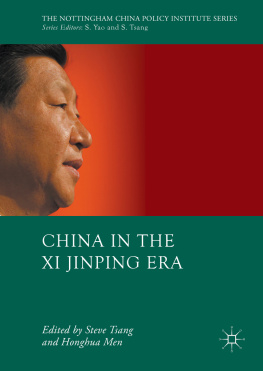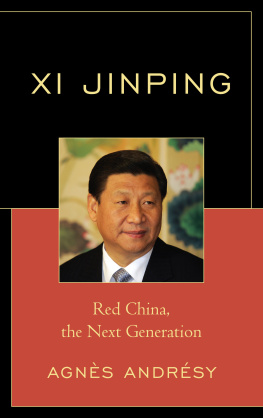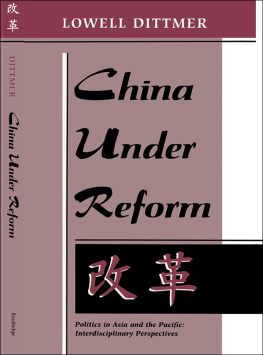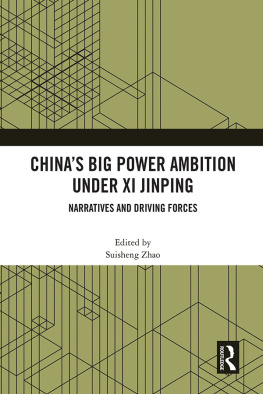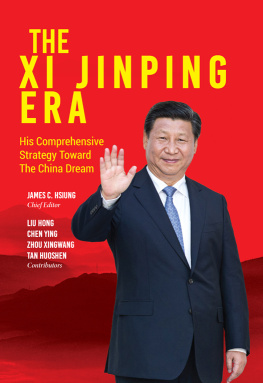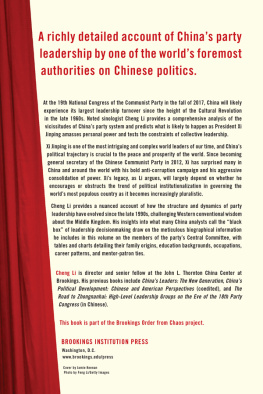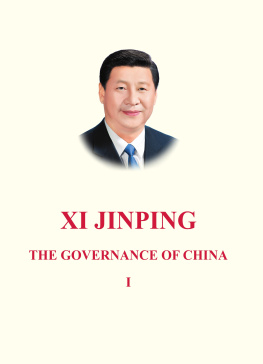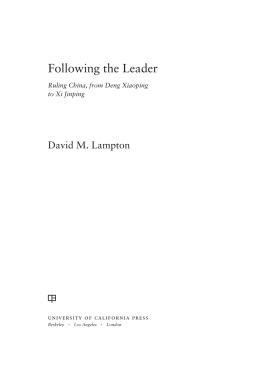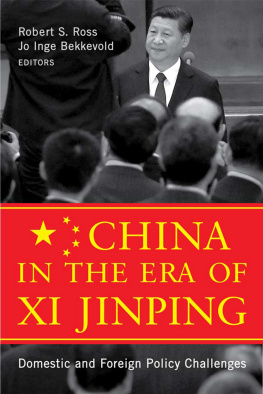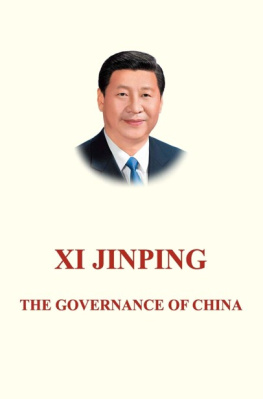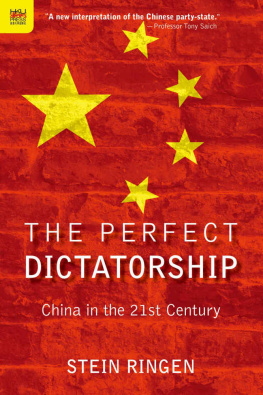1. Genesis of a Pivotal Decade
As Xi Jinping took the reins of the Communist Party of China (CPC) as its General Secretary at the 18th Party Congress in November 2012, he made it clear he would take the Peoples Republic of China to a new stage of developmentone of deepening reform. This was not just about rebalancing the economy but also about substantially improving governance and enhancing the role China would play in the world. Xis accession to power at the 18th Congress marked the turning of a new chapter in the era of post-Mao reforms.
The decade under Xis leadership, from 2012 to 2022, is going to be a pivotal one as he is determined to lead China towards national rejuvenation at a time when sustaining a fast rate of growth is becoming increasingly challenging. Chinas reforms have reached a stage where a crucial decision has to be made. Just prior to Xi taking over in 2012, when all Chinese leaders were reformers, it was not clear where that reform was heading or what the next stage would look like. China could stay the course or embark on an ambitious process of rebalancing the economy, with all the potential benefits and risks this would entail. As top leader Xi is not happy to rest on his laurels or muddle through. He is determined to use his decade in power to leave his mark.
As China steps into the second decade of the 21st century, it has already greatly enhanced its overall national strength. It is the second ranking power in the world by this measure or, for that matter, by economic prowess. It has become the top trading country and the fastest growing major industrial economy. But the need to rebalance the economy, after the benefits of the established model had been nearly exhausted in the decade under Hu Jintao, meant fresh impetus to sustain the economic miracle would need to be found. Full of confidence and determined to face this challenge squarely, Xi takes to heart an axiom of one of the great Chinese classics: Great achievements cannot be attained without ambition; success is impossible without hard work.
By the end of the decade of his presidency, Xi intends to turn the rhetoric of the China Dream into reality. More specifically this means converting the country into a moderately prosperous society, giving the amazingly rapid economic growth a new lease of life, and preparing it to transform itself from a regional power into a superpower, or at least a leading global power. The domestic and external goals are intertwined, and reaching them will have profound implications, both for the country and for the world. The prospect of the Xi transformation is therefore a matter of great significance and is the central focus of this book. How it shapes Chinas approach to dealing with the rest of the world is the subject of Chap. by Honghua Men.
Opportunities and Challenges
China is in the midst of a great transformation. It has already changed from being a regional power to a global power and is on a trajectory to become a superpower. As it does so, its global interests and capabilities are developing fast. by Christopher Hughes).
Under Xi, China is making the most of the capacities and progress it made in the last three decades of reform to seek new opportunities for further development and advancement. The steady improvement in the living conditions of its citizens and landmark achievements, such as becoming the second largest economy in the world, have helped the Chinese leadership to refine its objectives. What Xis administration aims to achieve by 2022 is to double the size of the gross domestic product (GDP) both nationally and on a per capita basis, whether in the urban centres or in the rural regions. This is what becoming a moderately prosperous society is intended to mean. The Party plans to build a strong national consensus around its commitment to make the China Dream a reality, and to use this process to galvanize everyone to join the efforts to build a rich, powerful, socialist-democratic, civil, and harmonious country. This approach is meant to shape the development strategy for the next three decades (see Chap. by Tianyong Zhou).
At the same time, Xi seeks to improve Chinas relations with the great powers and its neighbours. China is already the largest trading partner of nearly 130 countries and plans to build on this to promote mutually beneficial collaboration. The setback to economic advancement in the world brought about by the global financial crisis has been seized on by China as an opportunity to leave its mark. Its commitment to sustained growth has prevented the global economy from slipping further and led to it expanding its investment and interests far and wide. Since the global financial crisis, China is contributing to improvement in infrastructure and industrial capacity, not only domestically but also elsewhere through its outward investment. In its efforts to reach out, China is creating new opportunities and challenges for others.
The environment in which China needs to achieve its ambitions is tough and testing. The successful reforms of the previous three decades have also produced deep economic and societal contradictions. This is recognized by Xi:
In development, China faces a series of sharp contradictions and challenges, which means there are plenty of problems and difficulties in the way forward. They include the lack of balance, co-ordination and sustainability in development, inadequate capacity in innovation, irrational industrial structure, the lack of clarity and precision on how to develop the country, wide disparity in development and income between the cities and rural regions, and the increase in social contradictions To solve these problems the key lies in deepening reform.
Since the 18th Party Congress, China has embarked on the journey to rebalance the economy and seek a new normal for sustainable growth and development. How to do so is the crux of the matter (see Chap. by Baojiang Han and Shiping Qi).
The wider international and strategic condition is even more complex. There is a gap between Chinas capacity to fulfil its wish to take on more international responsibilities and what the wider international community expects of it. This has given rise to suspicion about its intentions. The rise of the China threat narrative and the contradicting demand that China should be a responsible stakeholder has made the task more daunting. As the advanced countries led by the United States of America (USA) seek to tighten rules and conventions in the international community to tame a rising China, Chinas neighbours also become concerned. They have consequently heightened cooperation with the USA. In other words, the more China develops rapidly, the more others suspect and worry about its intentions, and their responses in turn pose extra challenges and difficulties for China (see Chap. by Men).
Putting the domestic and external challenges and opportunities together, the Chinese Government still sees scope to seize the opportunities despite the difficult environment. As the celebrated poet Su Dongpo of the Song Dynasty observed: not letting something that lands on your hand slip away is good timing; not letting someone who passes by go unutilized is seizing the moment.

